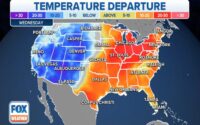Australia to allow psychedelics to treat PTSD, depression
Starting July 1, Australia will allow doctors to prescribe MDMA and magic mushrooms to treat PTSD and depression.
It’s a worldwide first that comes as research uncovers how psychedelic drugs have real potential for treating mental health conditions.
“Australia is creating an interesting model that could pave the way forward for the rest of the world,” Dr. Michael Alpert, a psychiatrist at Harvard Medical School, told ABC News.
MDMA is a synthetic hallucinogen, often linked to rave parties, that’s also known as “molly” or “ecstasy.”
According to the new rules established by Australia’s Therapeutic Goods Administration (TGA), MDMA can be prescribed only to treat PTSD (post-traumatic stress disorder) by authorized psychiatrists.
Psilocybin, the active compound in magic mushrooms, will only be prescribed to treat depression that hasn’t responded to other therapies.
A large and growing body of medical and scientific evidence supports the use of psychedelics for mental health disorders.

A 2021 clinical trial, for example, showed that people with PTSD who took MDMA paired with psychotherapy were twice as likely to recover compared to those who did psychotherapy with a placebo, according to the journal Nature.
And where science goes, money follows.
Hedge fund billionaire and owner of the New York Mets Steve Cohen recently donated $5 million to the Multidisciplinary Association for Psychedelic Studies (MAPS) for their efforts into legalizing the therapeutic uses of psychedelics.
“The market for psychedelic substances is projected to grow … to $10.75 billion by 2027, a growth rate that may even outpace the legal US cannabis market,” wrote the authors of an editorial in JAMA Psychiatry.
“It’s a pretty hot area,” Matthew Piggott, associate professor of medicinal chemistry at the University of Western Australia, told the Washington Post.
However, it may be too hot for some experts.
“Such decisions short circuit the clinical trials process itself and undermine the whole principle of evidence-based medicine,” Dr. James Rucker, consultant psychiatrist and senior clinical lecturer at King’s College London, told Medical News Today.
“If this is not managed by skilled psychological support practitioners it can lead to a worsening of someone’s condition,” Rucker added. “This is a slippery slope and a dangerous precedent, I fear.”

“Those of us … doing this research can see how there are going to be very few guardrails in place,” Dr. Paul Liknaitzky, head of clinical psychedelic research at Monash University in Melbourne, told the Washington Post.
“The safety and quality of what is provided is going to depend in large part on the goodwill and competence of the providers, not on authorities and governance,” Liknaitzky said.
The whole world — especially the U.S. — will be watching carefully as Australia becomes a nationwide experiment in psychedelic therapies.
Many American cities and states have loosened restrictions around psychedelics in recent years. In 2019, Denver decriminalized psilocybin — the state of Oregon followed suit one year later.
Both Oregon and Colorado now allow facilities with certain training certifications to offer psilocybin treatments.
A number of industry experts expect that the U.S. will authorize some kind of psychedelic therapy within a few years — if not a few months.
MAPS, which conducted the 2021 trial, is expected to petition the Food and Drug Association for approval of MDMA after its most recent study is published later this year.
Rick Doblin, founder and executive director of MAPS, believes that by taking the lead, Australia will help speed the approval process in other countries.
“It’s going to help regulators in the U.S. and elsewhere feel more comfortable,” Doblin told TIME. “Regulators don’t like to be the first or the only ones.”


